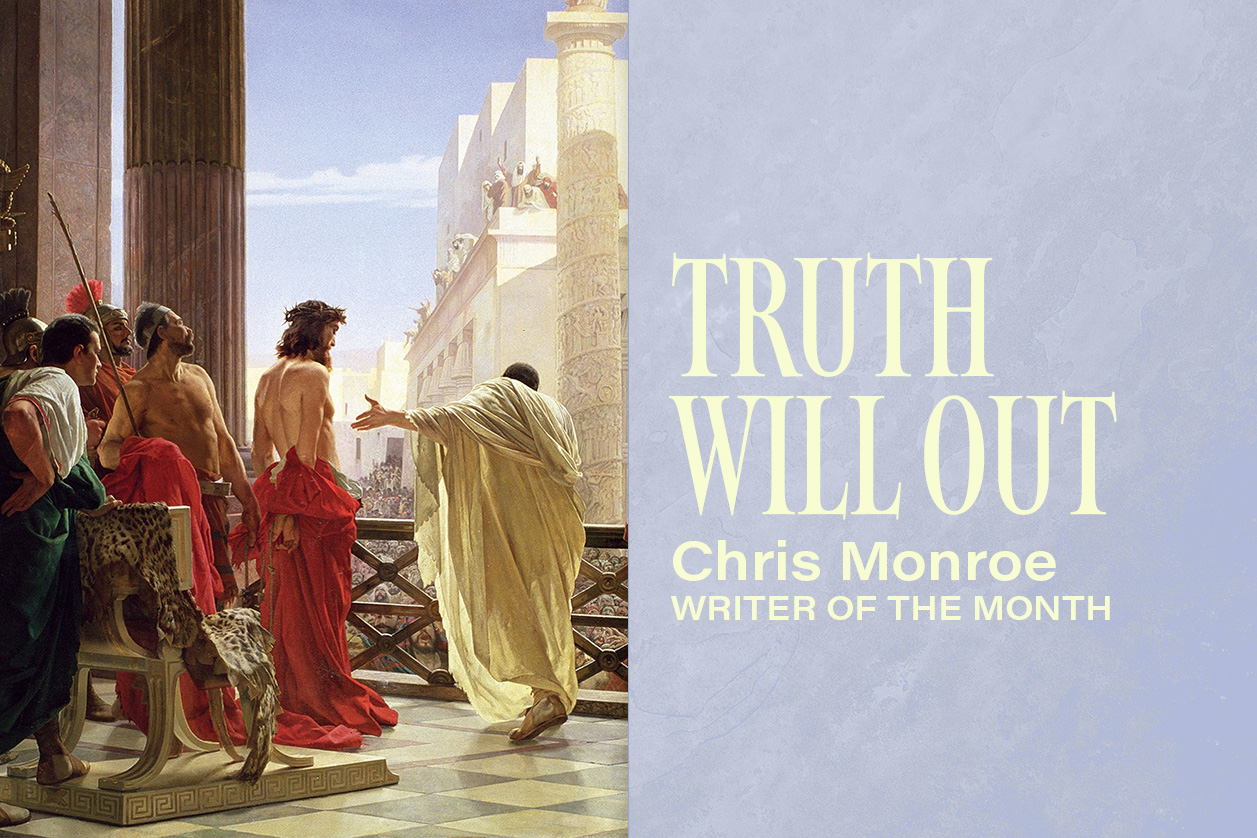
Truth Will Out
by Chris Monroe
"What is truth?" retorted Pilate. —John 18:38
Have you ever realized you were lied to? Did you realize it at the moment, or did you realize it over time? If you did realize it, did you do anything differently moving forward?
We might even ask, “Where do lies come from?”
Referring to the devil, Jesus tells us in John 8:44: “When he lies, he speaks his native language, for he is a liar and the father of lies.” True to form, we see the serpent lying to Adam and Eve at the beginning of creation in Genesis, and we see Satan deceiving the nations at the end of the world in Revelation.
Sadly, all of us will be forced to deal with lies in this world. So what can we do? How can we deal with these lies when they confront us?
Let us look at the complex character of Pontius Pilate, as portrayed in John 18:28–38, who was forced to deal with a lie. During the Roman empire, Pontius Pilate was governor of Judea and played a crucial role in the trial, sentencing, and crucifixion of Jesus Christ. During this ordeal, Pilate was lied to and told that Jesus was a guilty criminal deserving death. But the truth was that Jesus was an innocent man who had done nothing wrong.

What can we learn from Pilate’s ordeal? We can look at five major influences surrounding him:
ROME. Pilate has power and preeminence as governor of Judea, but he is still subject to those above him, notably the emperor, Tiberius Caesar. Pilate is expected to keep law and order in accordance with the dictates of the Roman empire, and fear of losing his position (or worse) is very real for him. Pilate recoils after he tries to present Jesus to the Jews as their king when they reply, “We have no king but Caesar.” He recoils again after trying to release Jesus when they declare, “If you let this man go, you are no friend of Caesar. Anyone who claims to be a king opposes Caesar.” Pilate’s fear of Caesar and the power of Rome are clearly working against him.
THE MOB. The lie that Jesus was a criminal is amplified as the religious leaders exercise their influence over the crowd. Very soon a mob forms, shouting in unison for Pilate to crucify Jesus. This social pressure from the mob overwhelms any chance for sensible dialogue and prevents Pilate from being able to reason with them. His exchanges with the mob only create confusion and complicate Pilate’s ability to think clearly.
PILATE’S WIFE. In the middle of this ordeal, Pilate’s wife sends him a message stating, “Don’t have anything to do with that innocent man, for I have suffered a great deal today in a dream because of him.” Amid the sea of voices, it is the voice of someone close to Pilate, someone he trusts, that helps nudge him toward the truth.
PILATE. During his ordeal, Pilate is influenced by his own way of doing things. He uses his reason and rationale, asking questions and gathering information. He uses his negotiation skills, offering compromises to try and please everyone. But as helpful as they are, Pilate’s tactics alone do not solve his dilemma. Pilate’s primary problem is being disconnected from what he needs most: truth. He is not rooted and grounded in truth. This is best revealed by Pilate himself when he asks Jesus, “What is truth?”
JESUS. The fifth major influence on Pilate is Jesus Himself. While talking to Jesus, Pilate is informed, enlightened, and utterly stunned by what Jesus says. It is in these private moments, while Pilate is alone with Jesus, that he slowly begins to understand the truth. He gradually realizes Jesus is not only innocent, but that Jesus is in fact a king. But despite his best efforts to have Jesus released, Pilate is unsuccessful, and Jesus is sent away to die.
During his ordeal Pilate realizes he is being lied to, but he still loses the battle. Does anything change for Pilate after this? Does he do anything differently moving forward?
While Jesus is being nailed to the cross, Pilate has a sign made that says, “Jesus, the King of the Jews.” Immediately Pilate is confronted with another lie. He is told the sign should read “this man claimed to be king of the Jews.” But Pilate responds by saying, “What I have written, I have written.” Pilate is forced to deal with another lie, but this time he rejects it. Instead of capitulating again, he bravely acts on what he knows is true and defeats the lie. Pilate knows the truth, and the truth sets him free.
What will be your biggest influence when you face another lie? Fear of losing status? Loud social pressure? Friends and family? Yourself? Or Jesus? Like Pilate, we can find the truth by being alone with Jesus, spending time in His presence, asking Him questions, hearing His voice, and listening to His words. Like Pilate, if we seek Jesus, we will find Him.
We will know the truth, and the truth will set us free.
Chris Monroe is the artistic director and facility administrator at the Times Square Corps, New York City.




